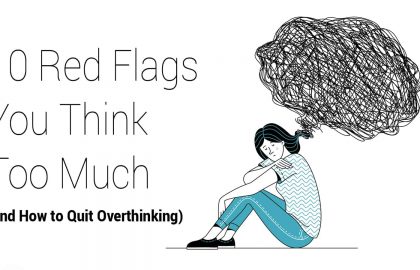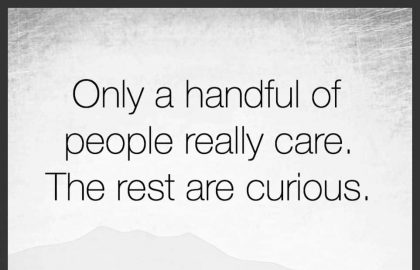You’ve seen it happen–what looks like a relationship made in heaven suddenly fizzles. You wonder what happened. How can you prevent this from happening to your relationship? So, what are 15 red flags of a doomed relationship?
Love is healthy for you. According to one study, love activates parts of your brain that reduce your stress levels and gives you a sense of pleasure. That’s powerful. But sometimes a relationship goes wrong, turning into a toxic relationship. This process doesn’t happen overnight. Like a balloon slowly losing air, the bond deflates over time.
Here are 14 red flags that reveal a doomed relationship
1 – Loss of friendship
Many people dismiss the idea that you can be good friends with your partner. They assume that means there’s no romance. But you can maintain your passion and be good friends with your partner. In fact, these kinds of relationships last longer because of their deep friendship. Friendship involves respect, care, and loyalty. These qualities are beneficial to romantic relationships as much as they are to friendship. Often, the longer couple is together, the more their friendship and romance grows.
2 – No honest communication
Studies show for a relationship to be long-lasting, there must be honest communication. Shallowness reveals a lack of genuine desire to grow the relationship. Talking honestly about your feelings makes you vulnerable.
If your partner isn’t willing to go deep, it could be a sign they’re not in the relationship for the long haul. There is the possibility your partner isn’t comfortable talking about their feelings. They may want to go deeper, but they don’t know where to start.
You can help by asking the right questions. Don’t try to ask all of them at once. Ask one or two questions at a time. Don’t interrogate, have a desire to learn and listen. Here’s a list of 12 talking points to spur more in-depth conversations with your partner.
- What part of our relationship makes you happy?
- What’s your biggest fear related to our relationship?
- What does love mean to you?
- What’s the hardest thing you’ve ever done? Why?
- What’s your favorite memory of our relationship so far? Why?
- What’s one thing you want to ask me, but are scared to ask? (I promise not to get angry)
- What do you think is a strength in our relationship? A weakness?
- If you could change our relationship in one way, what would that be?
- What bad thing has happened to you that has turned into a positive blessing?
- If you had a billion dollars, what would you do with it?
- What’s the worst thing that’s happened to you? Why?
- What’s the best thing that’s happened to you? Why?
3 – Secretive emails, phone calls or text
Keeping secrets is never a good sign in a relationship. Hidden conversations make you feel left out and not valued. It’s tempting to think your partner is cheating on you. Being secretive hurts your relationship’s trust and sense of protection.
If your partner is sending or receiving secretive texts or emails, ask them if you can talk to them. In an inquiring, calm way, ask them about the secrets. If they say it’s not a big deal or accuse you of stalking them, they’re not taking you or your relationship seriously. Secrets divide, they don’t promote faithfulness.
4 – Make decisions without talking to your input
If your partner makes a big decision without talking to you first, this is a sign of a doomed relationship. Decisions like large money purchases, or a vacation, buying or selling a house, or where to spend the holidays are significant. Big decisions should be discussed between a couple because they affect both people.
Independent decisions like these are often a subtle way of saying they’re disinterested. If your partner is doing this, ask them why. Don’t accuse, but calmly tell them what they’re doing is hurtful and confusing. If they defend their right to be independent, you may want to rethink for you to reconsider the relationship.
5 – Loss of respect
Respect is a foundational part of any relationship. Respect means to admire or esteem. If you respect someone, you consider their feelings, rights, and wishes. Respecting one another builds trust and loyalty in your relationship. Toxic relationships lack respect. A partner who doesn’t respect you will try to control you. Don’t stay in a relationship that lacks mutual respect. It’s headed for disaster, and you will eventually get hurt.
6 – Sarcasm and toxic humor
Having a good sense of humor is vital in a relationship, but toxic jokes at the expense of your partner do harm. Sarcasm about your partner’s looks, abilities, or feelings causes deep wounds. This kind of humor is toxic to a relationship. It tears and destroys. Some people bring this type of sarcasm into a relationship because they’ve never seen a relationship built on mutual trust and love.
If you’re doing this, it may be helpful to seek professional counseling to help you heal from your hurts and learn how to relate in a healthy way to your partner. If your partner is using sarcasm or toxic humor against you, you may need to draw a line.
Never stay in a relationship where you are belittled, mocked, or made fun of. This feeling isn’t healthy. Your partner may apologize or say they were just kidding, but this is weak. Toxic humor is never a joke.
7 – Anger or manipulation
Another component of a toxic relationship is anger and manipulation. Anger tears down relationships. It’s a profoundly destructive way to relate, leaving fear and mistrust in its wake.
Manipulation is forcing someone to do what you want without them realizing your real motive. It’s deceitful and just a desire to have power. Manipulation is sometimes seen in the way a man relates to women. But women aren’t exempt.
They may manipulate with pouting or being overly sensual. It’s still an attempt to get what you want using different methods. It’s immature, and a shallow way to treat your partner. Both anger and manipulation are big red flags of a doomed, unhealthy relationship.
8 – Differing values
Many relationships start excellent, but as time goes on, differing values get in the way of the relationship. Things like family, religion, self-discipline, i.e., exercise and eating, self-improvement in career or education, money, and children are significant values you bring into your relationship.
When you get past the early stages, you may find yourself on different pages when it comes to family or going to church or career choices. Your values are part of who you are. If your partner doesn’t value what you value, it may work out.
Instead of being a couple, you will be two independent people living together. If you and our partner lack common values, this could be a red flag that your relationship won’t last.
9 – Not resolving conflicts
Minimizing conflicts, or pretending like everything is okay, isn’t healthy in a relationship. Over time, things will start to decay and erode your affection towards one another. All couples have conflicts. It’s a normal part of being in a relationship.
What’s important is how you solve your conflicts. Learn how to have a fair fight. Fair fights have boundaries. These boundaries include
- Stay calm, don’t erupt into anger.
- Don’t use the word “always.” No one “always” does anything…
- Never threaten to leave or move out.
- Don’t change topics, stick on a theme for each conflict even if you think another issue relates.
- Never name call or belittle the other person.
- Listen, don’t interrupt even if you don’t like what they’re saying.
- Repeat back what you thought they said, “I think I heard you say…” If you aren’t getting it right, have them explain again what they meant.
- Say you’re sorry, then ask them to forgive you.
- Find common ground where you agree.
- Pick what’s worth arguing about and what isn’t. Putting someone’s dirty dishes in the dishwasher may not be worth having a significant conflict over.
If everything you discuss turns into a big conflict, this is a red flag that you’re in a domed, toxic relationship.
10 – Not willing to sacrifice
Being in a relationship involves self-sacrifice. Self-sacrifice isn’t a dirty word. It’s defined as giving up one’s self-interest to help others. It means you care for someone else besides your self. It could be demonstrated by you giving up your favorite television show to help your partner with paint the livingroom.
Or you coming up with some great craft ideas for your partner’s children who come over for the weekend. Giving up your time, energy, and love for your partner’s sake deepens your relationship. If your partner isn’t willing to give up things for your sake, it should be a big red flag.
11 – Being critical
Partners who are picky about your clothing, your hair, or your career, aren’t in love with you. They are in love with the image they want to project. True acceptance means loving a person for who they are, not what you want them to be. It doesn’t mean you can’t make suggestions or share ideas, but being critical about these things shows you aren’t accepted.
Critical people are never happy. They critique everything you do and say. This nit-picking is deadly to a relationship. Sadly, negative people rarely see their faults, because they’re too busy pointing out everyone else’s flaws. You can try to point this out, but you will probably get corrected for it. This habit is a red flag that you’re in, a toxic relationship that is sure to fail.
12 – Flirting with other people
Flirting with other people while in a relationship speaks volumes. It’s a red flag if your partner is doing this. Never think that’s just the way she is, or it’s not that bad. Public flirting with someone else is a slap in your face.
Never accept a weak excuse like, “I was just having fun” or “it’s nothing, why are you making such a big deal of it.” This excuse is deflecting and being dishonest. Your partner is showing you they aren’t as committed to the relationship as you are.
13 – Acting single
If your partner acts like they’re single, that’s a red flag. If they more I more than we, it reveals they aren’t into the relationship. Going places without inviting you along, or choosing to do things without telling you indicates your partner isn’t ready for a committed relationship but probably want to stay single.
14 – Loss of affection
If your relationship lacks affection, it’s headed in the wrong direction. Affections and intimacy is a big part of a genuine connection. Hugging, kissing, cuddling, or snuggling up with your partner is healthy and demonstrates love. If this is lacking, you are little more than roommates. Don’t fall into this trap; find ways to initiate affection with your partner every day.
If you are the only one initiating affection, it may be useful to find out why. Some people had poor examples of a healthy relationship growing up. They need to learn how to be affectionate. But if your partner is unwilling to be tender, this could be a bad sign of a doomed relationship.
Final thoughts on recognizing that you are in a doomed relationship
If you recognize these signs, all hope is not necessarily lost. If both you and your partner can commit to reconnecting and strengthening your bonds, you can try to heal. However, sometimes the kindest thing you can do for yourself is to recognize that it is time to cut the cord on a doomed relationship.






